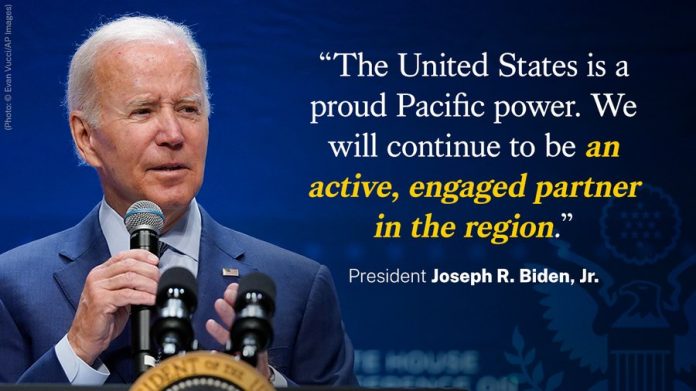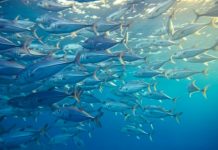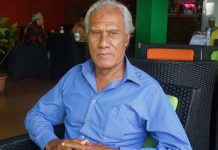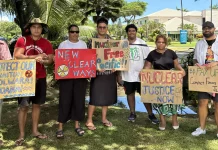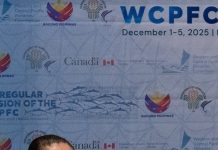“The United States is a proud Pacific power. We will continue to be an active, engaged partner in the region.” President Joseph R. Biden, Jr.
“The history and the future of the Pacific Islands and the United States are inextricably linked.” Vice President Kamala Harris
The Pacific Islands region – an “ocean continent” spanning nearly 15 percent of the Earth’s surface – is a vital sub-region of the Indo-Pacific. It holds opportunities and challenges, from the climate crisis to an increasingly complex geopolitical landscape. The United States recognizes that geography links the Pacific’s future to our own: U.S prosperity and security depend on the Pacific region remaining free and open.
To that end, the Biden-Harris Administration is elevating broader and deeper engagement with the Pacific Islands as a priority of its foreign policy. This national strategy, the first-ever from the U.S government dedicated to the Pacific Islands, both reflects and advances that commitment. It supports the Indo-Pacific Strategy of the United States and is aligned with the goals of the Pacific Island Forum’s 2050 Strategy.
As part of its Pacific strategy, the United States will pursue four objectives:
I. A STRONG U.S.-PACIFIC ISLANDS PARTNERSHIP
The foundation of our engagement in the Pacific Islands must be strong ties between the United States and the Pacific Islands, individually and collectively. We will:
* Fulfill and Increase U.S Commitments to the Pacific: We will fulfill our historical commitments and strengthen our enduring relationships with the full Pacific Islands region, including by:
*Successfully completing negotiations on the Compacts of Free Association (COFA) with the Republic of Palau, the Republic of the Marshall Islands, and the Federated States of Micronesia
* Successfully concluding negotiations on the South Pacific Tuna Treaty Annex amendments and associated Economic Assistance Agreement for 2023 and beyond
*Build U.S Capacity to Support the Pacific: The United States will demonstrate the level of diplomatic attention the Pacific deserves and position ourselves to best meet the needs of Pacific Island countries, including by:
*Expanding U.S diplomatic missions from six to nine across the Pacific
*Deploying additional personnel across the Pacific
* Reestablishing a USAID mission in Fiji
II. A UNITED PACIFIC ISLANDS REGION CONNECTED WITH THE WORLD
The Pacific Islands region is stronger united, with the Pacific Islands Forum at its core. The Pacific Islands Forum provides a platform for Pacific Islands to speak with a common voice to drive Pacific priorities and engage other partners, including the United States ‑ a proud Dialogue Partner of the organisation. We will coordinate with other nations and do so according to principles of Pacific regional cooperation, transparency, and accountability. We will:
*Bolster Pacific Regionalism and Elevate the Pacific in the Regional Architecture: The Pacific Islands are stronger when regional institutions are strong. The United States will continue to support the Pacific Islands Forum (PIF), ensuring it remains at the centre of the regional architecture. The U.S will elevate its commitment to Pacific regionalism by:
*Appointing the first-ever U.S. envoy to the PIF
* Encouraging connectivity with existing multilateral groupings, including the Association of Southeast Asian Nations (ASEAN) and the Quad
* Supporting other regional organisations
*Coordinate with Allies and Partners, within and beyond the region: The United States will continue to closely coordinate with our Allies and Partners to ensure our support for the Pacific Islands is effective and meets
*the needs of the people. We will prioritise consultation and coordination with the Pacific Islands and the PIF, including by:
* Bolstering the Partners in the Blue Pacific, an initiative among Australia, Canada, Japan, New Zealand, and the United Kingdom to better meet the needs of people across the Pacific
III. A RESILIENT PACIFIC ISLAND REGION PREPARED FOR THE CLIMATE CRISIS AND OTHER 21ST CENTURY CHALLENGES
The Pacific Islands region faces daunting and mounting challenges. Chief among these challenges is the climate crisis, an existential threat to many Pacific Islands. The United States is committed to maintaining its global leadership in combatting the climate crisis, while partnering with the Pacific Islands in adapting to and managing the impacts of climate change on lives, health, and livelihoods. The region also faces challenges to security and sovereignty, including in the maritime domain.
The Biden-Harris Administration will work in partnership with Pacific governments and people to ensure they have the autonomy and security to advance their own interests. We support the Pacific Islands as they guard against corruption and protect the dignity of Pacific Islanders. We will:
*Combat the Climate Crisis and Build Climate Resilience in the Pacific: Of all the 21st-century challenges we face, none is more pressing for the Pacific Islands region than climate change. We will collaborate with the Pacific Islands to tackle the climate crisis and limit its effects on the Pacific, including by:
*Striving to enhance the adaptive capacity and build upon the resilience of Pacific Islands to the devastating impacts of climate change through the President’s Emergency Plan for Adaptation and Resilience (PREPARE)
*Collaborating with partners and international institutions to improve Pacific Island countries’ access to adaptation finance from multiple sources
*Driving action and supporting investment in climate mitigation in the region
*Support Marine Conservation, Maritime Security, and Sovereign Rights: The United States will support the Pacific Islands as they continue to shoulder the great responsibility of stewardship over the Blue Pacific Continent, including by:
*Increasing United States Coast Guard (USCG), National Oceanic and Atmospheric Administration (NOAA), and Department of Defence (DOD) presence
*Coordinating security cooperation and training with likeminded partners and with civil society
*Developing sustainable, climate resilient “blue” economies to sustainably manage Exclusive Economic Zones (EEZs), including fisheries and protected areas and coordinate security cooperation and training with other partners
*Support good governance and the human rights of all people: The Pacific Islands region is home to diverse democracies and participatory governance. The United States will continue supporting democracy, human rights, and good governance, including by:
*Building capacity among Pacific Island stakeholders in government, private sector, media, academia, and civil society
IV. EMPOWERED AND PROSPEROUS ISLANDERS
To fully empower the Pacific to capitalize on the opportunities of the 21st century, the United States is committed to increasing trade and investment with the Pacific Islands, including through the Partnership for Global Infrastructure and Investment; expanding people-to-people ties, including through the Peace Corps; increasing English-language programming and overall professional advancement; bolstering health architecture in the Pacific; and providing educational and development opportunities for Pacific Islanders, with a particular focus on women and youth.
*Create Economic Opportunities and Forge Connectivity: The United States will partner with the Pacific Islands and partners and allies to drive economic growth and prosperity regionally and globally. We will focus on key logistics, transportation, and technologies to enhance connectivity within the Pacific Islands region and with the world, including by:
*Collaborating with partners on submarine cable implementation and upgrades and other connectivity options
*Working with Pacific Island leaders to leverage private sector solutions to advance strategic projects and commercial priorities in the region.
*Bolster Health Architecture to Promote Health Security: The United States will partner with public-health experts and networks to improve how the region effectively prevents, detects, and responds to infectious disease threats, including by:
*Working to meet the COVID-19 vaccination needs of the region to lift the Pacific Islands out of the emergency phase of COVID-19
*Strengthening regional health security in preparation for future outbreaks
*Partner with Pacific Islanders to Strengthen People-to-People Ties and Seize 21st Century Opportunities. We will support Pacific Islands in their objective to ensure that everyone can realize their full potential including by:
*Offering enhanced educational experiences through student and professional exchange, enhanced curriculum, and the establishment of Pacific Studies programs in the United States
*Empowering Pacific youth through leadership development opportunities
*Returning Peace Corps volunteer presence to Fiji, Tonga, Samoa, and Vanuatu this year and actively exploring options for opening missions in other countries.
SOURCE: THE WHITE HOUSE/PACNEWS






